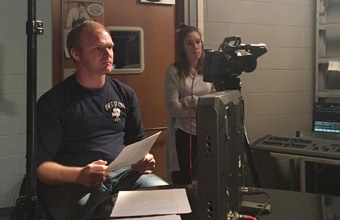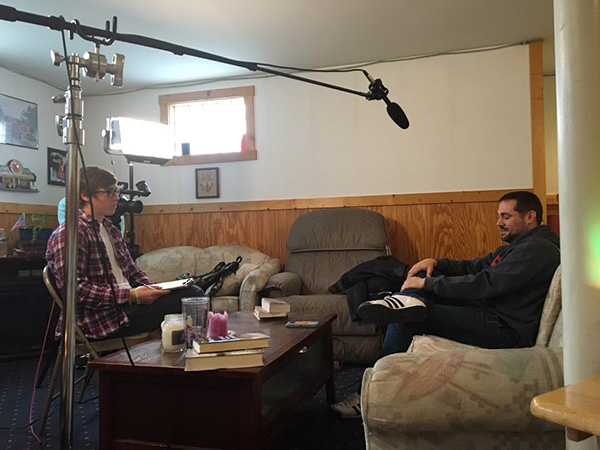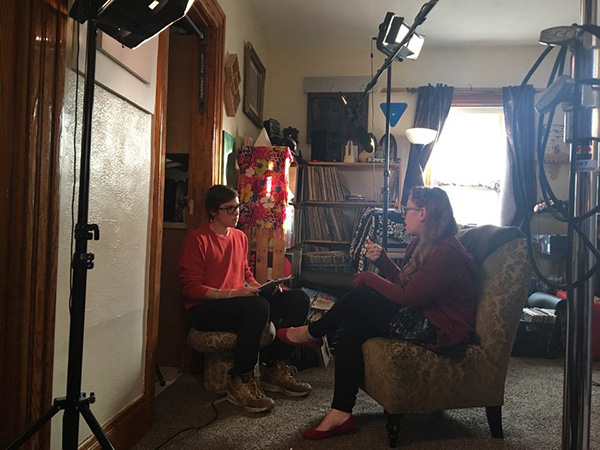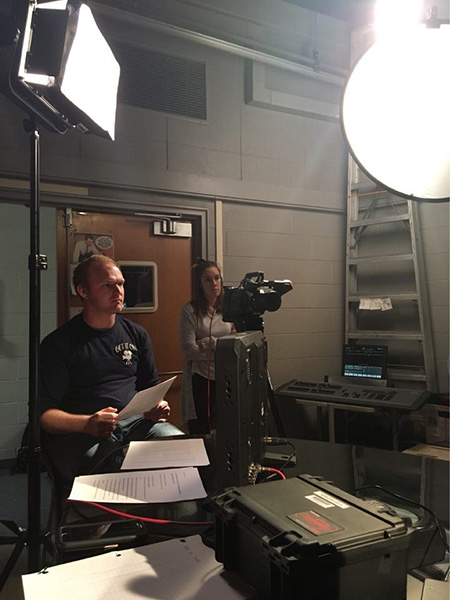College of Arts and Sciences Newsroom

Student Emmy Award Winner
A University of Dayton student-produced documentary about Dayton’s deadly opioid epidemic won a student Emmy Award from the Ohio Valley Chapter of the National Academy of Television Arts & Sciences.
Epicenter: Dayton’s Opioid Crisis, a 16-minute documentary that looks at the epidemic through the eyes of recovering addicts, their families and community leaders, won in the long-form nonfiction category.
The award will be presented Saturday, Aug. 18, during the Student Production Awards ceremony before the NATAS chapter’s annual Emmy Awards Gala at the Lawrenceburg Event Center in Lawrenceburg, Indiana. The chapter’s four-state region includes Ohio, Kentucky, Indiana and West Virginia.
This marks the first time the chapter has awarded a Pillar — the student equivalent of the Emmy — in the long-form nonfiction category since 2015. Documentaries by University of Dayton media production students earned honorable mentions in the same category in both 2016 and 2017.
“Winning the regional Pillar Emmy Award is a testament to the media production program we are building within the Department of Communication, specifically the strong work of co-advisors Roy Flynn and Greg Kennedy,” said Joe Valenzano, associate professor and department chair. “In three years we have won two honorable mentions and now the Pillar, and we are poised to build further off of these successes.”
Epicenter was produced during the 2017-18 academic year by 14 juniors and seniors in Kennedy’s Documentary Filmmaking course, with another six students also participating in various production roles.
Co-producer Taylor Alexander, a senior communication major from Gaithersburg, Maryland, attributed Epicenter’s success to the talent and dedication of her fellow crew members, as well as the documentary’s relevant subject matter. Last year in Montgomery County, Ohio, overdoses took the lives of at least 560 people.
“Our topic was timely,” Alexander said. “It was really emotional and powerful, and it’s something that affects everyone.”
Winning an Emmy was the students’ goal, but the response from the Dayton-based recovery support group Families of Addicts — with whom the students collaborated on Epicenter — also was important. The group was shown the documentary in advance of its official April 26 premiere on campus.
“Obviously, the validation from the Emmys, my peers and the campus community is wonderful, but the positive responses from members of the addiction and recovery community mean the most to me,” Alexander said. “To hear them say we got it right means the documentary achieved what we set out for it to achieve.”
Alexander plans to attend the ceremony to accept the award. She expects some of the crew to reunite for the event, although many of them graduated in May.
Graduate communication student Samuel Rita ’18 of Cary, Illinois, worked on Epicenter as a senior at the University. As a junior, he also worked on the preceding documentary, The Modern Entrepreneur: The Divided Path to Higher Education, which won an honorable mention in 2017.
“I’m really happy that we finally could get a victory and win the Emmy and make a change — not only through the academic program, but also in society,” Rita said.
Epicenter will now be submitted to national student competitions.
The University’s annual documentary production began during the 2015-16 academic year as an independent study project under the guidance of Greg Kennedy, media specialist in residence. The first project, All You Can Eat, looked at food access in the Dayton region and won an honorable mention in 2016.
In 2017-18, the production shifted from an independent study project to a three-credit hour course with designated class time during the spring semester. Kennedy said the transition allowed students to do pre-production work during the fall semester and then shoot and edit their footage during the spring.
“It has been really enjoyable to watch the students evolve from the first year we did this project to where we are now, where it is a course and, in fact, we’re doing some award-winning work,” said Roy Flynn, lecturer and Flyer TV manager. “It has been a long time coming to get to this point. I think the students now realize how much hard work goes into creating something that is award-winning.”
The Department of Communication will continue to increase focus on documentary filmmaking. This fall, Jesseca Ynez Simmons, filmmaker in residence at Northwestern University, will join the University of Dayton faculty.
“In today’s world, video has become one of the primary mediums for storytelling and we are proud that our students are gaining recognition through their work in this area,” Valenzano said. “We hope to build the program even more in the coming years, as our students’ and faculty work already has begun to attract the attention of the region and the industry.”
Epicenter is available for viewing on the University’s YouTube channel.
- Dave Larsen, communication coordinator, College of Arts and Sciences



